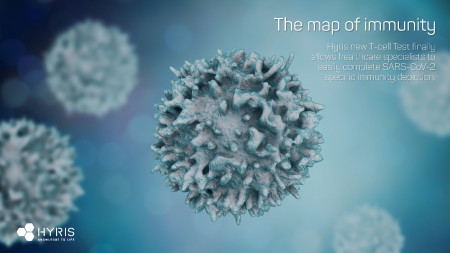Hyris' New T-Cell Test is Finally Available to EU Countries to Easily Map Patients' Cellular Immunity to SARS-CoV-2

LONDON, August 5, 2022 (Newswire.com)
-
As the pandemic crisis has entered a new phase, it is a common belief among the scientific community that COVID-19 is here to stay, maybe for a long time. Many scientists expect the virus that causes COVID-19 to become endemic. According to a 2021 Nature's poll, administered to more than 100 globally renowned immunologists, infectious-disease researchers and virologists, almost 90% of respondents think the Coronavirus will become endemic, continuing to circulate in pockets of the global population for years to come.
The quality of life of this 'endemic future' will heavily depend on our capability to systematically assess and monitor the type of immunity people acquire through infection or vaccination and how the virus evolves, thus maximizing vaccine effectiveness. A recently published Nature's study confirms that measuring the T cells' response is a new disruptive approach to fighting SARS-CoV-2. Responsive T cells could still protect an individual negative to an antibody test.
"Long-term protection from viral infections is mediated by both the humoral (antibodies) and cellular (T cells) immune pathways", explains Lorenzo Colombo, General Manager and CTO at Hyris, a fast-growing global biotech Company renowned for its democratic approach to genetic analysis. "While SARS-CoV-2-specific IgG and neutralizing antibody quantification are being used as the typical clinical endpoints to determine immune protection, a precise measurement of cellular responses underlying virus protection also represents an important parameter of immune defence", continues Colombo.
Although its strategic relevance is acknowledged worldwide, cellular immune response assays are rarely performed due to the associated technical challenges. "Detection of antigen-specific T cells is Typically quantified by flow cytometry, ELISpot or ELISA," points out Colombo. "These techniques, while robust and well accepted in the field, require a skilled workforce and are relatively costly and time-consuming."
This is where the new T-Cell Test from Hyris comes into play. The fruit of months of experimentation in collaboration with some of the most important medical schools in the world, this new test is finally available for the EU Market after receiving the CE-IVD mark. "Our new T-Cell Test overcomes the limitations typically involved with immune cellular response testing, thanks to its unique two-part process", clarifies Colombo. Colombo also describes the main steps of the test: "At first, T cells are stimulated within a whole blood sample. Secondly, the sample is analyzed via qPCR in direct amplification to detect potential activation of the T cells".
This test brings attention to the future deployment of portable qPCR-based systems and could enable immunology testing for a much wider number of patients. "Historically, qPCR-based diagnostic approaches have been limited by laborious, error-prone and expensive RNA extraction methods", says Andrea Fabbri, Chief Commercial Officer at Hyris. "The new assay on T cells response works in direct amplification, making this protocol more efficient, rapid and scalable". Fabbri goes even further, highlighting the disruptive features of the Hyris System™, Hyris' unique AI-powered diagnostic suite. "Thanks to the unprecedented portability and modularity of the HYRIS bCUBE™ [the hardware device at the basis of the Hyris System™, ed.], our System enables us to collect real-time PCR data and to provide any user with instant results anywhere and at any time".
Fabbri also addresses the issue of energy consumption, an increasingly sensitive topic in the molecular biology industry. "The Hyris System™ is also green compared to other technologies traditionally used in this field, with an energy consumption similar to a single 20 w light bulb, more than a tenth of that of other comparable devices on the market".
This new assay has been highly anticipated all over the world, both by the scientific community and healthcare specialists. The test immediately helps answer the crucial question at this pandemic stage: "How long is your COVID immunity good for, whether from a vaccine or prior infection?" The truth is, we do not know for sure yet: the temporal threshold commonly accepted is about three or four months, but the latest variants circulating proved to be more capable of breaking through our immunity.
"In front of such a challenging frame, we cannot be content with our knowledge about antibody response, which is just half of the picture", holds Stefano Lo Priore, Co-Founder and CEO at Hyris. "The other half, T-cell response, is rarely sought due to the technical challenges involved. That is why we aimed for simplicity, by using technology that is widely accessible and can turn around results more quickly. Concludes Lo Priore: "Now that key response about our immunity can be tested affordably and massively, leveraging the immediacy, connectivity, and scalability of the Hyris System™".
Contact a Hyris expert to discover how to perform beyond your current diagnostic capability at info@hyris.net
Source: Hyris
